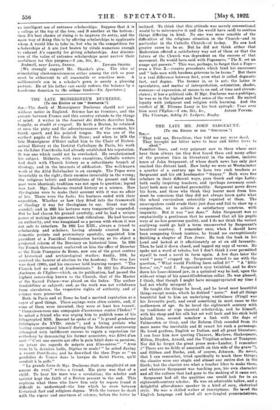entente between France and this country extends to the things
of mind. A writer in the Journal des Debats describes him, happily, as erudit et croyant. By birth a Breton, he retained at once the piety and the adventurousness of the seaman, his frank speech and his pointed tongue. He was one of the earliest pupils of the Ecole de Rome; and when in 1878 the late Monseigneur d'Hulst called him to the Chair of Ecclesi- astical History at the Institut Catholique de Paris, his work on theLiber Pontificalis had already established his reputation. It was one which could not be overlooked. He revolutionized his subject. Hitherto, with rare exceptions, Catholic writers had dealt with Church history as a subordinate branch of theology, and in the interests of edification. The well-known work of the Abbe Rohrbacher is an example. The Popes were invariably in the right; their enemies invariably in the wrong; the religious beliefs and institutions of the present and the past were identical; tradition was not open to question; legend was fact. Mgr. Duchesne treated history as a science. How
theologians were to make their account with it was no affair
of his. There were the facts; his business ended with their exposition. Whether or how they fitted into the framework of theology it way for theologians to say. Great was the scandal; and in 1885 his lectures were temporarily suspended. But he had chosen his ground carefully, and he had a unique power of making his opponents look ridiculous. He had become an authority, and was recognized as a person with whom it was not safe to interfere. In 1902 Leo XIII., always a friend to scholarship and scholars, having already created him a domestic prelate and protonotary apostolic, appointed him president of a Pontifical Commission having as its object a projected reform of the Breviary on historical lines. In 1905 the French Government conferred on him the office of Director of the Ecole Franeaise de Rome, now one of the great centres of historical and archaeological studies; finally, 1910, he received the honour of election to the Academy. The wise Leo was dead (1903), and his successor held learning suspect. " The Church had no need of Academicians." In 1912 his Histoire Ancienne de l'Eglise—which, on its publication, had passed the highest censorship known to the Church, that of the Master of the Sacred Palace—was placed on the Index. The author laudabiliter se subjecit; and, as the work was not withdrawn from circulation, the respective rights of authority and of science were preserved.
Both in Paris and at Rome ho had a merited reputation as a
sayer of good things. These sayings were often caustic, and, if some of them were invented, they were at least ben trocati. "Connaissez-vous one compagnie d'assurance centre l'Index? " he asked a friend who was urging him to publish some of his lithographed MSS. Bossuet he spoke of as " le grand gendarme theologique du XVID. siecle "; and a living prelate who having compromised himself during the Modernist controversy attempted with indifferent success to regain a reputation for orthodoxy by denouncing his former associates, was fletri d'un inot—"C'est une cocotte qui offre le pain Unit dans sa paroisse, en jetant des regards de mepris aux filler-meres." " Avez sous lu la derniere bulle, Digitus in oculo?" he asked during a recent Pontificate; and he described the then Pope as "un gondolier de Venise dans la barque de Saint Pierre, qu'il conduit it la gaffe."
"La grande force de Mgr. Duchesne &sit sa simplicite at son amour du vrai," writes a friend. His piety was that of a child. To hear his mass was a revelation; the scholar and satirist kept the faith of a Breton peasant to the end. This explains what those who knew him only by repute found it difficult to understand—the line which he drew between historical fact and religions dogma. With the former he dealt with the rigour and exactness of science; before the latter he
inclined. To think that this attitude was merely conventional would be to misconceive it and (he would have said) to confuse things differing in kind. No one was more sensible of the difficulties of the religious situation in the Church—and in particular in the Catholic Church—of to-day. No one had greater cause to be so. But he did not think either that Modernism offered a satisfactory way out of them or that the future of the Church was dependent on the success of that movement. He would have said with Fogazzaro, "Pie X. est un nuage qui passera." This was, perhaps, to forget that a Pope— even a Pius X.—creates precedents which bind his successors and " lade men with burdens grievous to be-borne." But there is a real difference between fact, even what is called dogmatic fact, and dogma. The former is, or is not; the latter is speculative, and matter of interpretation, estimation, shades, nuances—of expression, of means to an end, of time and circum- stance; it has a political side. If Mgr. Duchesne was a politique, he was so in the highest and best sense of the word. He united loyalty with judgment and religion with learning. And the verdict of M. Etienne Lamy is his best epitaph : l'ous are: bier serri rEglise.—I am, Sir, &e., ALFRED FAWKES. The Vicarage, Ashby St. Ledgers, Rugby.


































 Previous page
Previous page